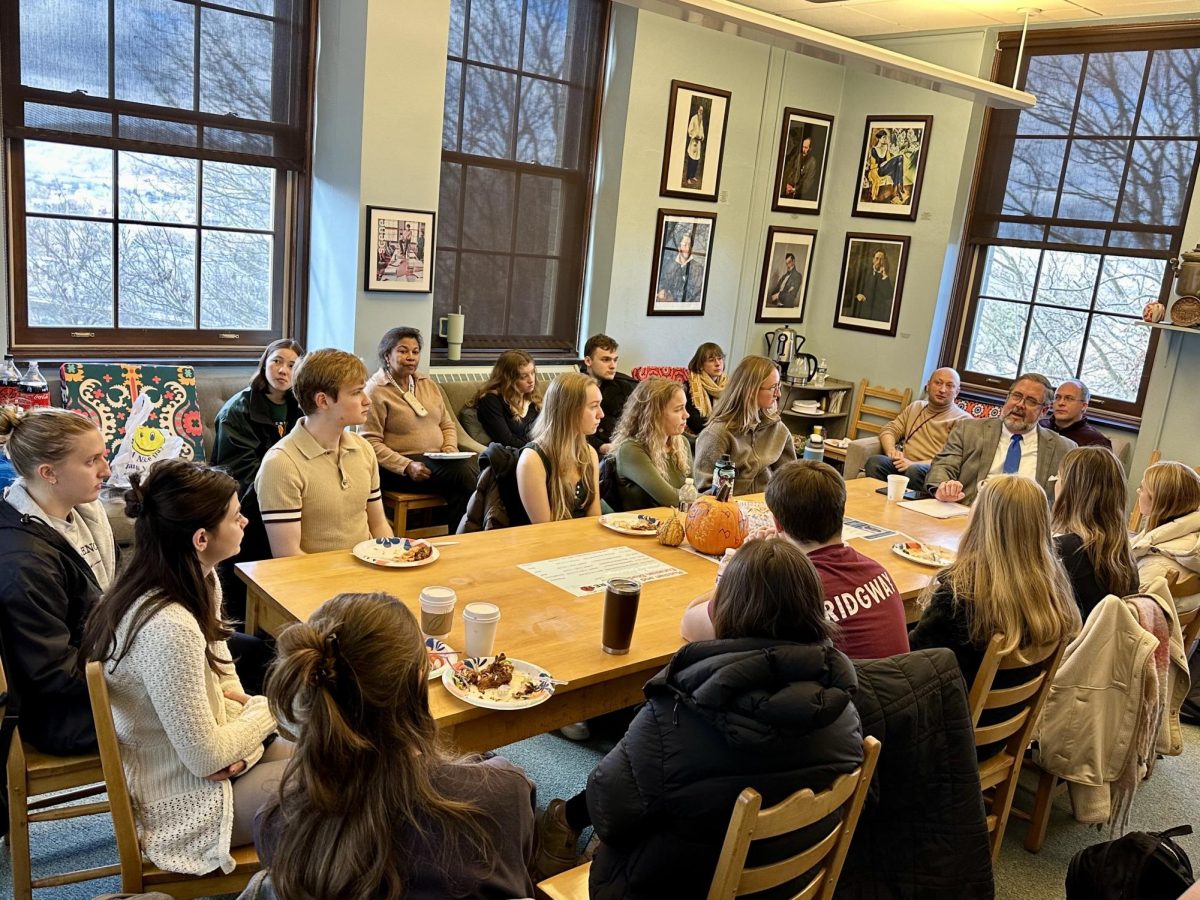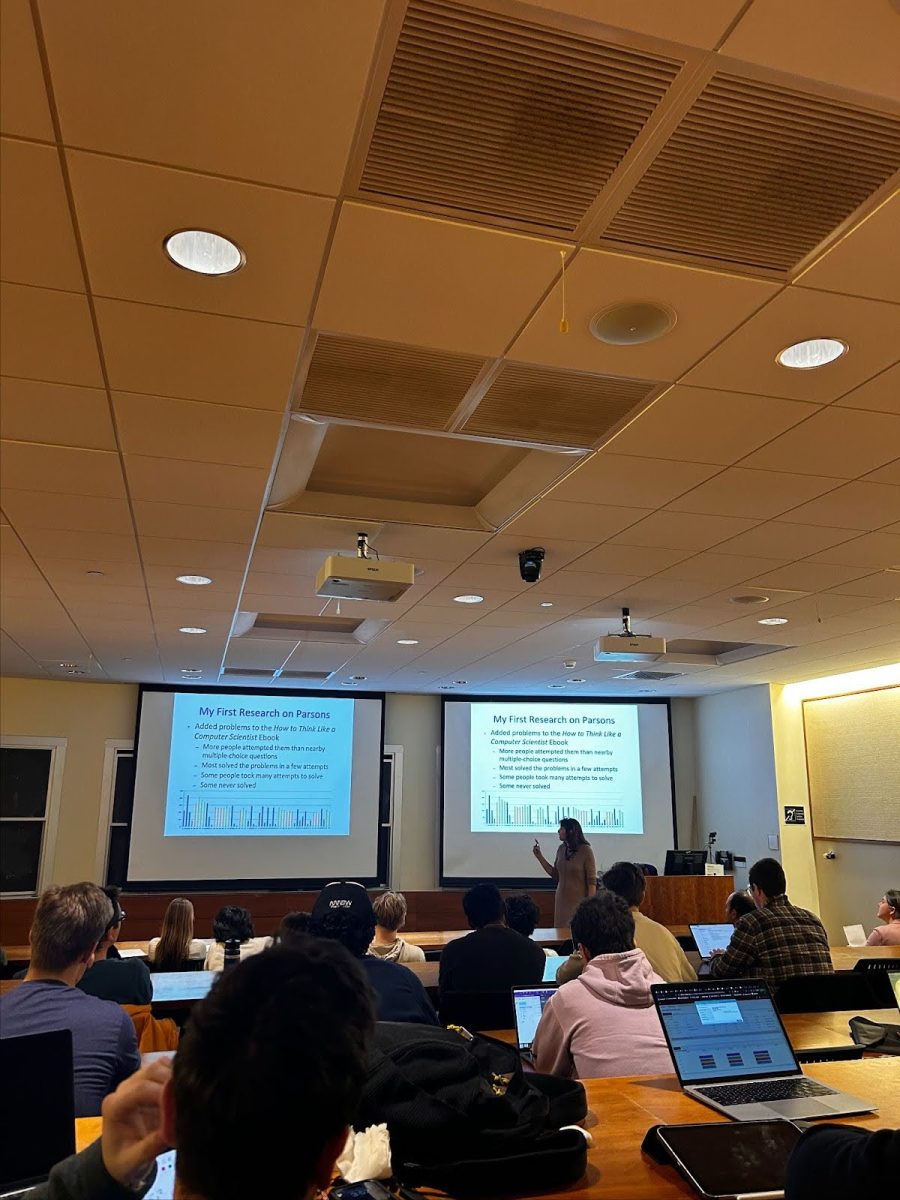Colgate University hosted an episode of WCNY’s longest-running television series, “Ivory Tower,” in the Colgate Memorial Chapel on Thursday, April 17. WCNY, owned by the Public Broadcasting Service (PBS), recorded the hour-long tape-to-live episode, which covered local topics and current events. “Ivory Tower” airs weekly and is a round-table discussion between academics from New York State. The panelists included Professor of Practice in Political Science at Le Moyne College Anirban Acharya, Director and Associate Professor of the Applied Intelligence program at Gannon College Ben Baughman, Professor and Chair of the Political Science Department at Colgate University Nina Moore, Visiting Professor of History at Hamilton College Ty Seidule and W. Bradford Wiley Chair in International Economics at Colgate University Chad Sparber. “Ivory Tower” is hosted by David Chanatry, professor of journalism at Utica University and director of the New York Reporting Project.
This episode of “Ivory Tower” focused on the recent police shooting in Syracuse, N.Y., on Sunday, April 14, bias in the news, the state of the American economy under the Biden administration and the growing crisis in the Middle East.
Regarding the police shooting in Syracuse, the panelists contributed various viewpoints. The shooting took the lives of Onondaga County Sheriff’s Office Lt. Michael Hoosock and Syracuse police officer Michael Jensen. Sparber and Baughman focused on the health of the police themselves and humanizing the police more as a society.
“The media coverage when an officer is shot in the line of duty is significantly limited when you look at when officers have to use deadly force on other people,” Baughman said. “[That is] really important, but then utilizing applied intelligence in real-time to help mitigate and reduce the amount of events like this has also shown to be effective in other countries, so I think prevention, mitigation and investigation supporting those would also help [police safety].”
Baughman recognized that his suggestions could not change what happened in Syracuse, but he suggested the dwindling support for police officers has translated into the number of officers that have been killed.
Sparber agreed that more should be done to appreciate the service of police officers, noting that the job leads to increased health risks. According to a 2013 paper published in the International Journal of Emergency Mental Health, there is a deficiency of the life expectancy rate for police officers.
“[The paper] documented the massive deficiency and life expectancy rate for police officers relative to the general population. And it’s not just the things that we would think about, like the danger of the job, but [also] shift work, obesity and general stresses that lead to increased heart disease and cancer,” Sparber said.
Moore found that the root of the issue lies more in the ready access to firearms, particularly the access to military grade weapons and illegal parts.
“In this particular case, if the offender did not have a high powered gun, and if he didn’t have in his possession something that could allow him to sound off or use 40 rounds and essentially shoot more shots than could be countries in the space of some 30 seconds, then I think the police would have had much more of a fighting chance than they did,” Moore said. “So we have to think about [whether] we need basically everyday citizens to have high powered weapons, and I think the answer to that is no — and that’s how we protect the police.”
The panelists then discussed the ideological slant in news reporting, its possible influences and the role of social media.
“We talk about politicians having their base, but so do news media outlets, and so do those who are consuming the news,” Moore said. “[People] are not looking for new information — [people] are looking for bases or outlets to basically confirm what [they] already know.”
Although the politicization of news outlets may seem like a new problem, Seidule puts forward that we have always had this problem, such as the “yellow journalism” that was based on sensationalism in the 19th century. According to Seidule, the difference between then and now is the Fairness Doctrine, which required broadcast stations and networks to air contrasting views and ended during the Reagan administration.
“[The end of the Fairness Doctrine] meant that any news organization could have a slanted or a singular view. Maybe not even slanted, but a singular view,” Seidule said. “But then you go to today’s news outlets and you really only have two newspapers that are making money at this point: The New York Times and The Wall Street Journal, and I do think The [New York] Times would benefit from looking at The Wall Street Journal. There is a clear divide [at The Wall Street Journal] between what they write in the news and what they write in the opinion pieces […]. I look at the opinion page [and] I don’t agree with everything it says, but at least there is a split between the two.”
Following Seidule’s comment, Chanarty asked Acharya for his thoughts on the mainstream media and whether it is trying too hard to manifest a false balance between ideologies.
“I, personally, as a political scientist, don’t think there is anything called objective news. There never has been. Every news in that way is politically charged. It has a political angle. It has political power,” Acharya said.
The discussion then transitioned to the current state of the economy and the livelihoods of Americans.
“I think the economy and the economic data is sort of a Rorsach test right now,” Sparber said. “You’re going to see what you want to see, and Biden can’t run on his economic success yet.”
Sparber cited a few weaknesses in America’s economy.
“The first [weakness] is median inflation adjusted earnings are just one percent higher than they were in the first quarter of 2020. Second, personal savings are about half now what they were in 2019. Third is that 2023 was the least affordable year to buy a home in recent history. And, finally, Biden’s economic policies,” Sparber said.
Lastly, the panel discussed the increasing tensions in the Middle East following Iran’s airstrikes on Israel on Friday, April 19. Chantary argued the recent attacks can’t be ignored.
“There needs to be no idealized view of this theocratic, […] tremendously repressive regime that Iran has, but that doesn’t take away from the fact that this attack is neither inexplicable [nor] unprovoked,” Acharys said.
Beidule, on the other hand, had concerns about the potential escalation of the situation.
“I worry about this as an escalatory event, that there have been a series of escalatory events. Certainly, Israel bombed a consulate, which is — no matter how you say it — the Iranian territory,” Beidule said. “Then there is a response from Israel, and so that escalatory nature could get even worse.”
The audience also had a chance to ask the panelists questions.
First-year Micah Spicer was in attendance and asked about the economic implications of gun control. Baughman considered the implications of unregulated guns entering the market.
“The regulations tend to hit the law-abiding citizens a lot harder than a lot of where these weapons are coming from [and] being utilized, [such as] ghost guns. [There are] all sorts of weapons being introduced into the market due to the drug trade and human trafficking,” Baughman said.
Moore added on to Baughman’s comment, suggesting we think more about racial and socioeconomic implications related to gun violence.
“I think the other thing we have to remember also is that the states and areas with the highest gun regulation [and] the strictest gun laws also happen to be the areas where you have the highest criminal victimization rates, especially in regard to minorities,” Moore said. “So we can talk about the economic implications, but there are also the racial implications [and] socioeconomic implications.”
First-year Owen McCabe inquired about how Biden’s policies during the COVID-19 recession contributed to a soft-landing of the economy. Sparber responded that the Federal Reserve played a major role in the economy’s soft landing during the recession.
“I think that’s more the Federal Reserve’s role,” Sparber said. “The Federal Reserve has the dual mandate to maintain sustainable unemployment and fairly constant prices. [In] some ways I think it was a miracle; it took everyone by surprise that this soft landing seems to have happened.”
First-year Kate Everett reflected on the event and how she left with a desire for more conversations on the topics.
“I found the conversation incredibly engaging and was really interested in the different perspectives each participant brought to the table,” Everett said. “I honestly felt the entire event could have been longer, as I feel like each topic could’ve been delved into deeper. I enjoy learning about current events from people with greater understanding [on] the topics as a whole.”
The next episode of “Ivory Tower” will air on Friday, April 26, on WCNY-TV.














